

No, 'App Neutrality' Is Not A Thing. Last month, BlackBerry CEO John Chen tried to kiss up to major wireless carriers on the issue of net neutrality with a truly bizarre missive that received ample mockery in the technology press.
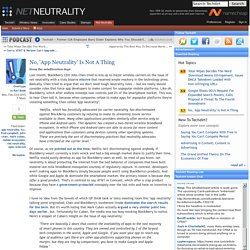
Basically, Chen tried to argue that we don't need tough neutrality rules -- but we really should consider rules that force app developers to make content for unpopular mobile platforms. Like oh, BlackBerry, which after endless missteps now controls just 2% of the smartphone market. Tech giants blast FCC's net neutrality proposal. In an open letter to the Federal Communications Commission, major Internet and technology companies are united in their fight to keep the Internet free and open.
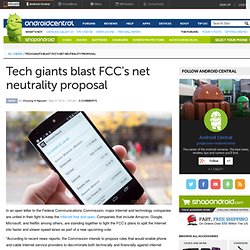
Companies that include Amazon, Google, Microsoft, and Netflix among others, are standing together to fight the FCC's plans to split the Internet into faster and slower speed lanes as part of a new upcoming vote. 'Net neutrality' ruling could be costly for consumers, advocates say. A federal appeals court swept aside government regulations designed to ensure equal access to the Internet, raising the prospects of higher fees for consumers and more barriers for start-ups seeking to compete online.
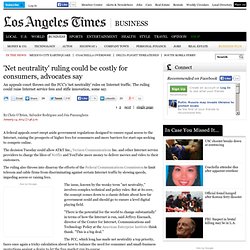
The decision Tuesday could allow AT&T Inc., Verizon Communications Inc. and other Internet service providers to charge the likes of Netflix and YouTube more money to deliver movies and video to their customers. The ruling also throws into disarray the efforts of the Federal Communications Commission to limit telecom and cable firms from discriminating against certain Internet traffic by slowing speeds, impeding access or raising fees. The issue, known by the wonky term "net neutrality," involves complex technical and policy rules. But at its core, the concept comes down to a classic debate about how far government could and should go to ensure a level digital playing field. Rebuffing F.C.C. in ‘Net Neutrality’ Case, Court Allows Streaming Deals. WASHINGTON — Internet service providers are free to make deals with services like Netflix or Amazon allowing those companies to pay to stream their products to online viewers through a faster, express lane on the web, a federal appeals court ruled on Tuesday.
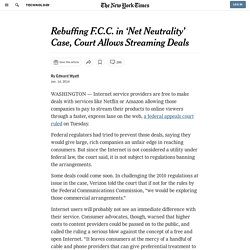
Federal regulators had tried to prevent those deals, saying they would give large, rich companies an unfair edge in reaching consumers. But since the Internet is not considered a utility under federal law, the court said, it is not subject to regulations banning the arrangements. Some deals could come soon. Can Europe really offer startups a better deal on net neutrality? As net neutrality goes down in flames stateside… Watching US #netneutrality news.
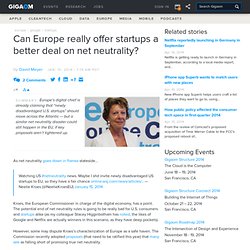
Maybe I shd invite newly disadvantaged US startups to EU, so they have a fair chance online.wsj.com/news/articles/…— Neelie Kroes (@NeelieKroesEU) January 15, 2014 Kroes, the European Commissioner in charge of the digital economy, has a point. The potential end of net neutrality rules is going to be really bad for U.S. consumers and startups alike (as my colleague Stacey Higginbotham has noted, the likes of Google and Netflix are actually winners in this scenario, as they have deep pockets).
However, some may dispute Kroes’s characterization of Europe as a safe haven. Specifically: “Providers of content, applications and services and providers of electronic communications to the public should therefore be free to conclude specialised services agreements on defined levels of quality of service as long as such agreements do not substantially impair the general quality of internet access services.” Court FCC Ruling Will Let Big Monopolies Take Over the Internet.
Countries like China or Russia, with centuries-long traditions of authoritarian rule, revert to their past practices when confronted with any kind of novelty.
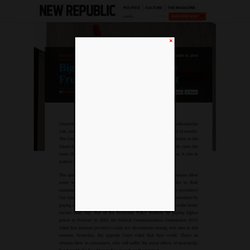
The United States, with its tradition of frontier free marketism, reverts to the laissez-faire when confronted with the new. But the result in both cases the same: the radical constriction of popular democracy and freedom. A case in point is yesterday’s Appeals Court ruling on net neutrality. The question is this: Can internet providers like Verizon and Comcast allow some web companies to provide better (that is, faster) service to their customers than their competitors by paying a higher price to the providers?
Can Amazon knock an upstart by providing better service to its customers by paying off Verizon? The obvious villain is the Appeals Court, but the damage was actually done earlier. Marc Andreessen talks about the pros and cons of net neutrality and the need for innovation. Ever since he returned to Twitter in January, after not posting anything on the network for almost three years, legendary entrepreneur-turned-venture-capitalist Marc Andreessen has been tweeting up a storm, discussing a range of tech and social issues with almost anyone.
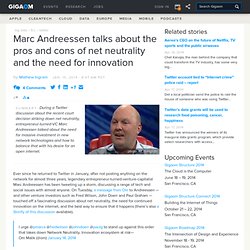
On Tuesday, a message from Om to Andreessen — and other venture investors such as Fred Wilson, John Doerr and Paul Graham — touched off a fascinating discussion about net neutrality, the need for continued innovation on the internet, and the best way to ensure that it happens (there’s also a Storify of this discussion available). I urge @pmarca @fredwilson @johndoerr @paulg to stand up against this order that takes down Network Neutrality. Innovation ecosystem at risk— Om Malik (@om) January 14, 2014 @om In ideal universe I want both net neutrality + fast growing investment in existing&new networks.